American Climate Perspectives Survey 2023, Vol. III
American Attitudes on Nuclear Energy in 2023
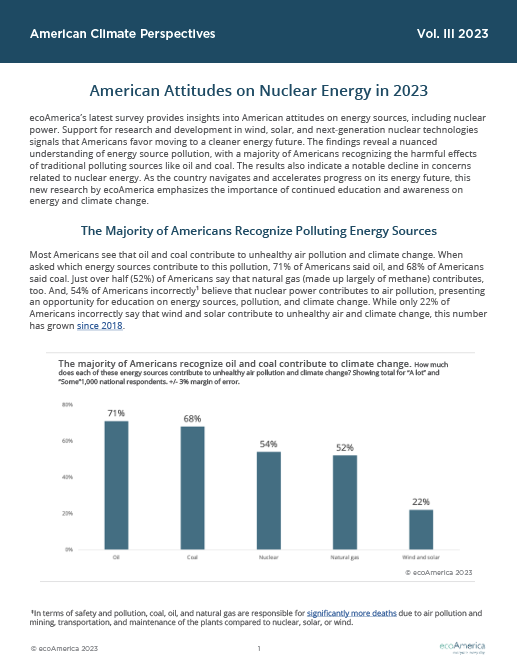
ecoAmerica’s latest survey provides insights into American attitudes on energy sources, including nuclear power. Support for research and development in wind, solar, and next-generation nuclear technologies signals that Americans favor moving to a cleaner energy future. The findings reveal a nuanced understanding of energy source pollution, with a majority of Americans recognizing the harmful effects of traditional polluting sources like oil and coal. The results also indicate a notable decline in concerns related to nuclear energy. As the country navigates and accelerates progress on its energy future, this new research by ecoAmerica emphasizes the importance of continued education and awareness on energy and climate change.
The Majority of Americans Recognize Polluting Energy Sources
Most Americans see that oil and coal contribute to unhealthy air pollution and climate change. When asked which energy sources contribute to this pollution, 71% of Americans said oil, and 68% of Americans said coal. Just over half (52%) of Americans say that natural gas (which is made up largely of methane but often referred to as “natural gas”) contributes, too. And, 54% of Americans incorrectly1 believe that nuclear power contributes to air pollution, presenting an opportunity for education on energy sources, pollution, and climate change. While only 22% of Americans incorrectly say that wind and solar contribute to unhealthy air and climate change, this number has grown since 2018.
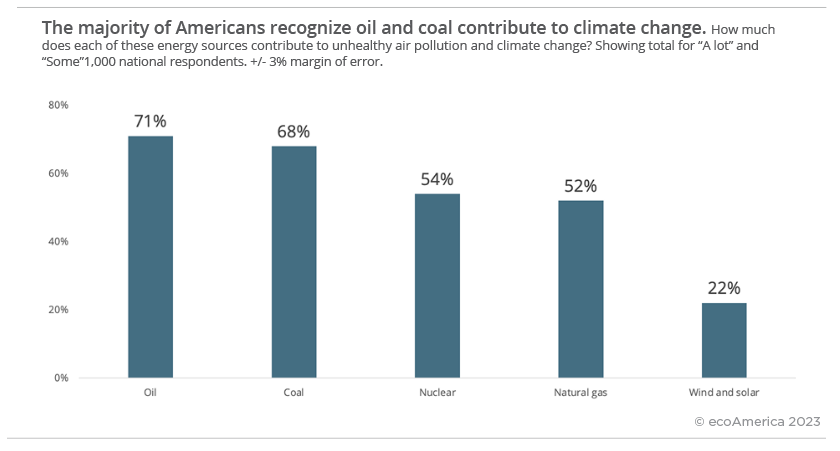
For a copy of the report with detailed graph descriptions, click here.
Americans Favor Wind, Solar, and Nuclear R&D Over Oil, Coal, or Methane
When asked which energy sources should receive research and development (R&D) funding from the United States over the next few years, most Americans select wind and solar (73%), and over half of Americans select next-generation nuclear (53%). Fewer Americans support spending on R&D for energy that burns fossil fuels, including oil, natural gas (methane), and coal. Only 39% of Americans support R&D spending on oil and gas and only 31% support R&D spending on coal.
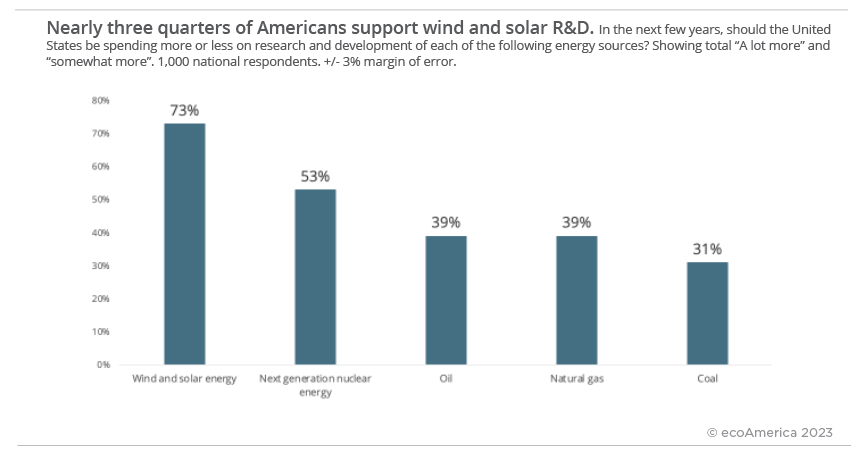
Over Half of Americans Voice Support for Nuclear Power
America’s traditional nuclear power plants produce around 20% of our electricity. ecoAmerica asked Americans if they support nuclear power and just over half (52%) said they either “strongly” or “somewhat support nuclear power”. Looking more closely at findings by political affiliation reveals that Republicans lead the support for nuclear energy. Nearly 3 in 5 Republicans (59%) report their support for nuclear, compared to 53% of Independents and 48% of Democrats.
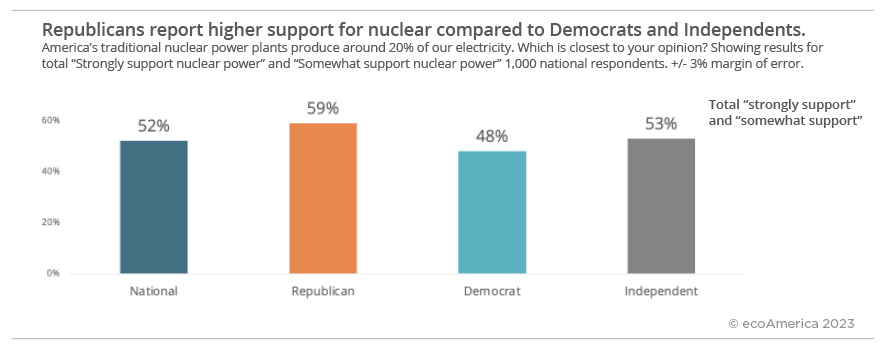
Americans Support Nuclear for Reliability, Economy, Climate, and Health
When asked what the most important reasons are for supporting nuclear was, the majority of Americans pointed to reliability and our economy, climate, and health (71%). Many Americans also say that nuclear power plants keep America competitive and energy-independent (69%), they should be kept running until lower-cost renewable energy becomes available (69%), or as long as they are cost-effective in the long term (68%), and that nuclear does not emit pollutants that harm our health or our climate compared to other alternatives (68%).
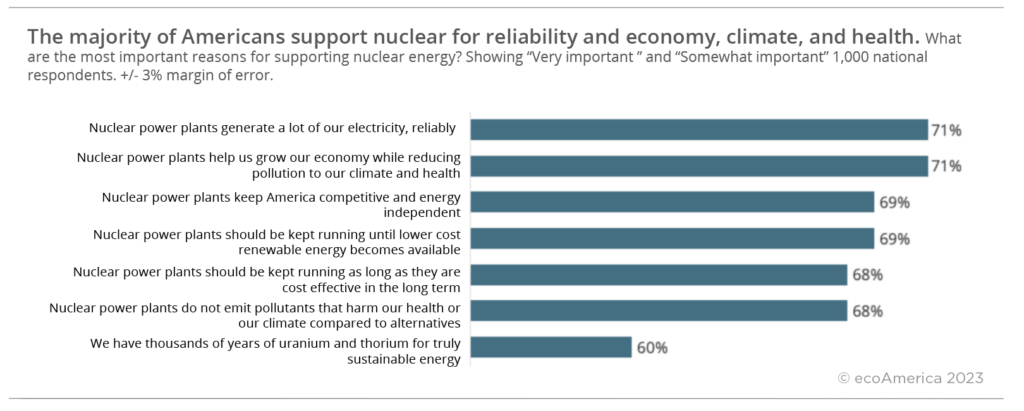
Waste Disposal and Health and Safety Remain Concerns, but Nuclear Energy Concerns Wane Overall
Concerns about nuclear energy remain for the majority but have lessened over time among Americans. As seen below, fewer Americans reported concerns with nuclear energy health and safety, waste disposal, overpopulation, cost, security, and weaponization in the past 6 years from 2018 to 2023.
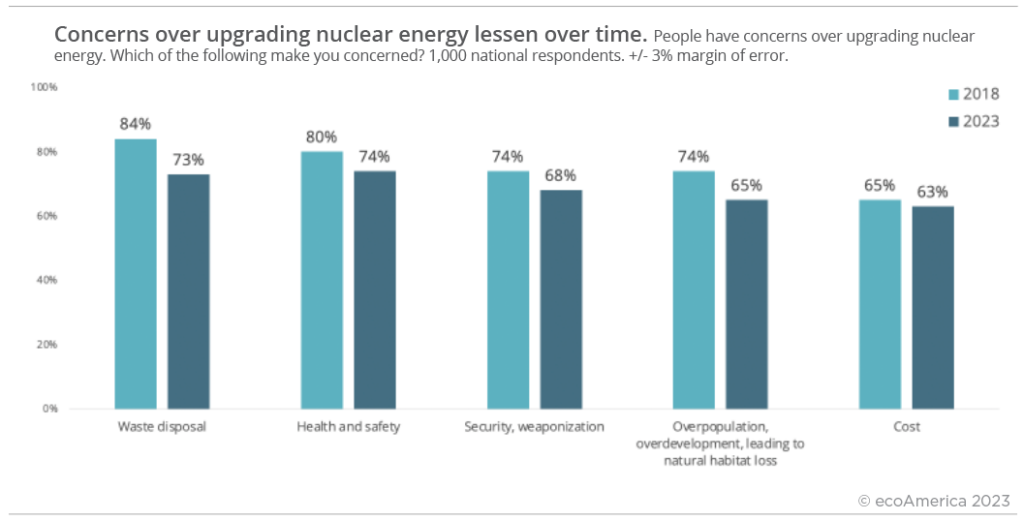
While waste disposal and health and safety are top concerns when it comes to nuclear energy, results show that concern is lower for Americans today compared to 2018.
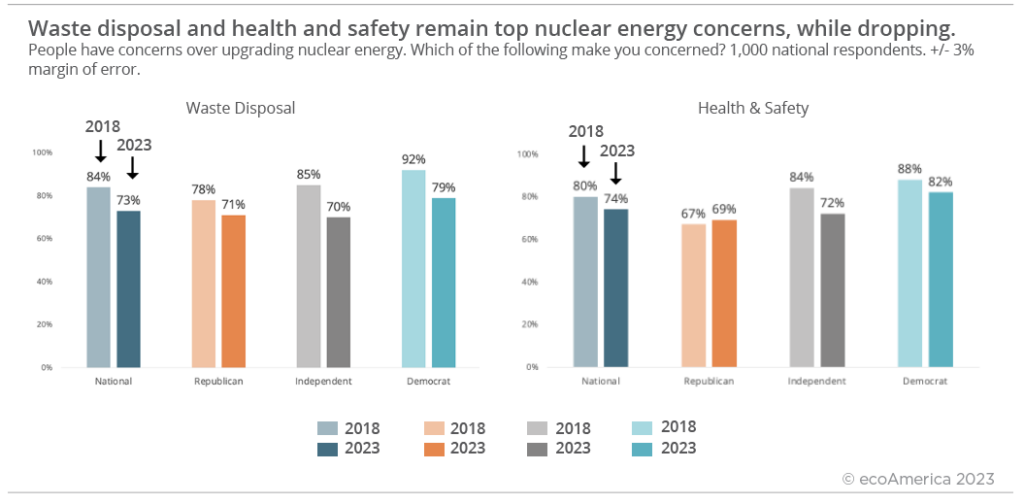
Nationally, concern has dropped 11 points when it comes to nuclear waste disposal — from 84% in 2018 to 73% in 2023. Concern about nuclear waste disposal among Democrats and Independents has dropped more significantly from 92% to 79% and 85% to 70% respectively. Concern among Republicans dropped 7 points from 78% in 2018 to 71% in 2023.
National nuclear health and safety concerns have also dropped from 80% to 74% in this same time period. The majority of Democrats are still concerned about nuclear health and safety today, however, fewer are concerned than in 2018 (82% vs. 88%). The survey finds that concern among Independents dropped 12 points from 84% in 2018 to 72% in 2023. Republican concern remains lower than the other political parties at 69%.
Because addressing climate change requires a rapid transition away from fossil fuel energy, American attitudes on energy supply have received increasing attention. The good news is that support for wind and solar energy remains high, support for nuclear power is rising, and oil, coal, and methane continue to have the lowest levels of support from Americans. Still, there is a pressing opportunity to increase education in order to advance progress. We have the technological capability we need to move forward. We must work together to push for equitable climate solutions that protect our health and our planet.
1In terms of safety and pollution, coal, oil, and natural gas are responsible for significantly more deaths due to air pollution and mining, transportation, and maintenance of the plants compared to nuclear, solar, or wind.
Methodology
ecoAmerica designed and administered this survey, which was conducted online on September 7-13, 2023 using Survey Monkey. The survey yielded a total of 1,000 complete adult responses and used the Census Bureau’s American Community Survey to weigh the national general population and reflect the demographic composition of the US. The sample was drawn from an online panel and the respondents were screened to ensure that they were over the age of 18. The margin of error for the sample is +/-3%. In interpreting the survey results, it is important to note that all sample surveys are subject to possible sampling error. Thus, the results of a survey may differ from the results that would be obtained if the entire population was interviewed. The size of the sampling error depends upon both the total number of respondents in the survey and the percentage distribution of the responses to a particular question. For example, if 50% of the respondents in a sample of 1,000 respondents answered, “Yes” to a particular question, we can be 95% confident that the true percentage would fall within 3 points, or range from 47% to 53%.
Suggested Citation
Speiser, M., Hill, A. N. (November, 2023). American Climate Perspectives Survey 2023. Vol III. American Attitudes on Nuclear Energy in 2023. ecoAmerica. Washington, DC.
© 2023 ecoAmerica. The contents of this report may be shared and used under a Creative Commons Attribution Non Commercial NoDerivatives 4.0 International License.
ecoAmerica does not hold a formal position on nuclear energy.
For more information contact us at research@ecoAmerica.org.
Subscribe to receive ecoAmerica’s research in your inbox.